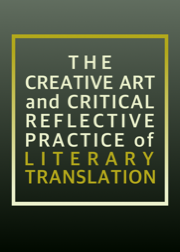Breadcrumb
- Home
- Graduate Programs
- Degrees and Certificates
- Master of Fine Arts in Literary Translation
Master of Fine Arts in Literary Translation

Program Brochure for Prospective Students
The Master of Fine Arts program in literary translation requires 48 s.h. of graduate credit, including a thesis. Students must maintain a cumulative g.p.a. of at least 2.75. They typically complete the program and graduate in two to three years.
Translators in the program focus on creating works that can convey the distinctness of the original languages and the immediacy of contemporary languages, whether poetry, fiction, or drama. Students consider ideas of literariness, style, cultural politics, authority, and how these come into play in the relationships between authors and their texts, authors and translators, translations and readers, and in the media landscapes in which these circulate.
At the core of the M.F.A. program are the workshops, TRNS:7460 - Translation Workshop, IWP:5205 - International Translation Workshop, and TRNS:6555 - Translator in Residence Workshop, which every student must take for a minimum of 12 s.h. of credit. Depth in the literature and culture of the source language, creative writing (translation is considered a writing art), translation theory and history, and contemporary literary theory are basic curricular requirements, supplemented with elective courses in which students may develop an area of special interest in consultation with their advisors.
During the first year, each student has an advisory committee of two faculty members: one from the translation program, who is the student's primary advisor; and one from a department in the Division of World Languages, Literatures and Cultures or from one of the M.F.A. writing programs. A third member joins the committee during the second year, when a student submits the thesis proposal. At least one member of the committee should be competent in the student’s source language.
Listed below are the general categories of coursework required to earn the degree; for more specific information on courses, curriculum, and requirements of the Master of Fine Arts in literary translation, visit the UI General Catalog.
| Title | Hours |
|---|---|
| Core Courses and Workshops | 36 |
| Electives | 9 |
| MFA Thesis (see below) | 3 |
| Total Hours | 48 |
Important Deadlines
Application Deadline: January 15th (for all programs)
Admission
Admission decisions are based on prior academic performance, letters of reference, and the applicant's statement about background and purpose. Applicants must meet the admission requirements of the Graduate College; see the Manual of Rules and Regulations of the Graduate College on the Graduate College website. For more information, see the Admissions Process page.
Engaged Practice
We live and work in an increasingly interconnected world where virtually every form of exchange—from goods and information to values and ways of seeing—has come to depend on translation. MFA students are therefore encouraged to seek service and outreach opportunities, and overseas research and practical experience.
MFA Thesis
Students earn 3 s.h. for the thesis, which is a translated collection of poems, literary essays, short stories, a short novel, or a drama with an introduction that sets the work in appropriate context. The introduction should include a critical discussion of issues and problems related to the translation; it should present a rationale for the translator’s approach and strategies, based on interpretation, analysis of the leading features, structure, style, or authorial objectives of the source text. The source text should be a work that has not been translated previously or, at the discretion of the advisory committee, a work whose previous translation is judged to be outdated or inadequate in some respect. An oral defense of the thesis examines the student’s translation and the introductory essay in detail. MFA in Literary Translation Thesis Guidelines